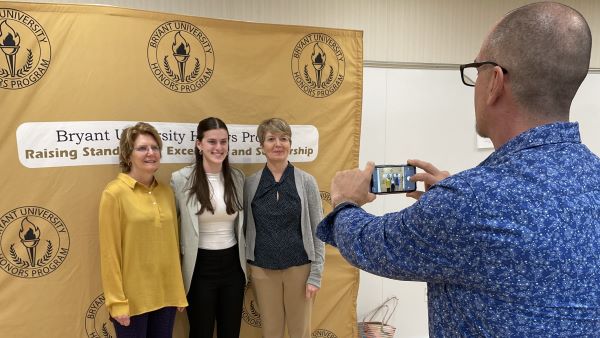Have you ever thought about skipping a meal with the hope of improving your body image? That’s one of the probing questions posed to Bryant’s female students by Julia Tricarico ’24, an Honors Program student who joined 40 of her peers in sharing their final thesis projects during a day-long event on Wednesday, April 10.
Tricarico’s magnus opus — “The Societal Factors that Influence Body Image Perceptions in Female Bryant Students” — concluded months of inquiry into body dissatisfaction among her Bryant peers.
“Beauty is a social construct, and we as a society have defined what it means to be beautiful,” says Tricarico. “We’ve all just conformed to these norms, and women at Bryant are struggling to fit into it.”
Standing confidently before an audience of faculty, friends, and family in the Quinlan/Brown Academic Innovation Center — including her sister, Hannah, who listened live via Zoom from Springfield, Massachusetts — Tricarico walked through her findings. The substance drew from 62 Bryant women who anonymously answered her 19-question survey on mental health and the influences of factors such as social media and mass media.
For students in the Honors Program, the Honors Thesis culminates a four-year journey. Along the way, the cohort explores subjects in greater detail through specially designed courses, a networking trip with industry leaders, and attendance at conferences.
“In the spring of junior year, a student in the Honors Program is developing their topic, and that often comes from a course that they’ve found significant or interesting,” explains Professor of Sociology Judith McDonnell, Ph.D., who served as Tricarico’s faculty advisor. Faculty offer critical guidance and feedback to students one-on-one throughout the three-semester project.

Thesis themes in the Class of 2024 spanned the curricula: the implications of artificial intelligence, gender discrimination in the music industry, universal design for learning financial literacy, and the neurobiology of psychopathy, for example.
A major in Human Resources Management, Tricarico chose an issue tied to her minor: Sociology.
“I took a class my sophomore year — “Sociology of Gender, Illness, and Health” — and did a research paper on eating disorders in Asian women,” shares the Seymour, Connecticut, native. “That sparked my interest and inspired me to continue.”
As a student in the accelerated 3+1 MBA program, Tricarico launched her work earlier than most. The 3+1 enables students to complete their undergraduate studies in three years and spend their fourth on MBA coursework, earning two degrees in just four years. Despite the time crunch, she delivered compelling results.
Tricarico learned that women have heightened vulnerability to poor self-image during the massive life changes that occur from ages 18 to 25, such as leaving home and meeting new people: “That can include changing eating habits in order to feel better about how we look.”
It’s that pointed question — Have you ever thought about skipping a meal with the hope of improving your body image? — that delivered perhaps the most gripping piece of data. More than 75 percent of the Bryant women surveyed answered “yes,” and 85 percent of the student-athletes who responded — 22 of 26 women — also answered “yes.”
Most admitted that social media plays a role in their perception of self.
“There is this general message across all media of idolizing thin women. It’s the idea that if you’re thinner, you’re going to be more successful,” says Tricarico, noting that AI editing tools like Photoshop create and promote false realities like faultless bodies and flawless faces. “There’s definitely more progress to be made.”